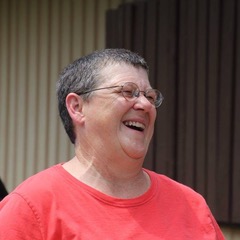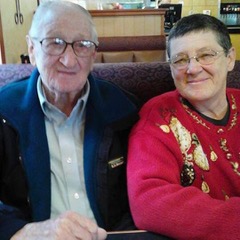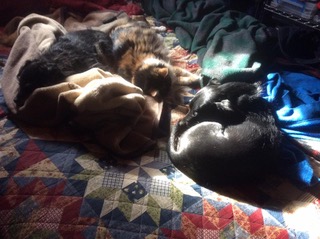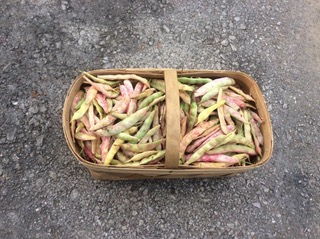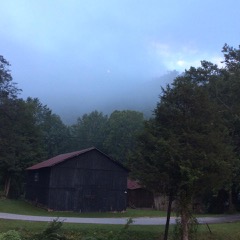Poverty and Riches by Janice Stamper
Rays of the morning sun and crisp cool air stream through the cracked window in the dining room of this old farm house in rural eastern Kentucky. While the President held a rally in Kentucky last week I was trying desperately to find someone to help me replace the window before winter. I keep hearing him say we’re making America great again, yet those words sound like noisy gongs and clanging symbols as I struggle to survive well below the poverty level in rural Appalachia.
I grew up in poverty on this farm in the 1960s with my parents, brother, grandfather, and great uncle in a small 3 room house. Avidly reading of the world as a child, I dreamed of leaving the hills. I longed for a life better than my parents, of not having to do without basic needs like running water, indoor plumbing, and new clothes that weren’t hand-me-downs from my brother.
In 1989 I was ordained as a Minister of Word and Sacrament in the Presbyterian Church (USA). I had finally reached my dream of being able to not worry about living in poverty.
My first call was to the Savoonga Presbyterian Church on St. Lawrence Island in Alaska where I had no running water nor indoor plumbing. I lived in a manse built in the 1940s where in the winter the temperature was between 48-52 degrees with the furnace running. I soon realized working in the church did not mean I would not continue to struggle living in poverty.
I have chosen in ministry to serve those in need regardless of what they could or would pay, and currently, I am a Minister at Large doing pulpit supply on Sundays. That has often meant that I have lived at a monetary level lower than those I have served. Systems in the larger church continue to allow and even, at times, promote this reality. Often, this means that I do not earn enough to be allowed to participate in the church’s medical and pension benefit plans.
In 2010, after 30 years of ministry in Alaska, I returned to the family farm to help my aging father. He was trying to help a drug addict and she was stealing from him. I cared for and helped my father until his death in March of this year. I have spent the last 8 years living in a run-down farm house, combatting termites, water leaking into the house, and trying to keep the place warm while worrying about paying bills and having enough food. I’ve cut wood for heat, planted gardens, canned every bit of food possible, and scraped to get by on what little is available. Living in a food desert hasn’t helped, and has made it very difficult to find nutritious healthy food.
Until the passage of the Affordable Health Care Act, I lived without insurance when churches didn’t provide it. I just didn’t go to the doctor or dentist. After the AHC Act was passed I qualified for Medicaid. Little did I know the stigma and scrutiny that would follow from so many, including the Governor of Kentucky, the President, and clergy colleagues.
The American dream has been based on having more-more money, more possessions, more of everything, and I was taught to want more. In wanting more, I realized what I didn’t want, too. I didn’t want others coming into Appalachia to make fun of me anymore for what we didn’t have. I didn’t want to feel ashamed for the tattered condition of how we lived. I have listened to the rhetoric in this country about the poor being lazy, about Appalachians being dumb, and about how I just need to move and get a job while the President just keeps shouting “Make America Great Again.” I’ve listened to how I shouldn’t be allowed to buy steak or shrimp, nor sodas or candy. I’ve listened to colleagues and friends tell me to just move, follow my bliss, or get a job with a larger church that has money. Meanwhile. I watch the government on state and federal levels passing laws that will make life more miserable for those already living in poverty while making those who are rich have all the wealth.
It’s much different to live in poverty than to ponder it theologically and write about it. There is a constant worry about just having the basics of shelter, heat, clean water, and food. Sometimes I must choose which is most pressing at the moment. I don’t get to go on vacations, study leave, conferences, nor gatherings of the denomination. I don’t get to enjoy fine dining, movies, concerts, or plays. I feel ashamed when I show up preaching wearing the same clothes because I can’t afford new ones. I don’t wear a robe & stoles because my old ones are tattered and I can’t afford new ones. I find that I am often invisible to many within the denomination as well as within society.
There is a stigma that goes with being poor. It’s our own fault. We just aren’t trying hard enough to find work or be productive. We’re just not educated. I’ve heard it all. Somedays I work more hours in one day than most do in a week just trying to survive. There are countless nights of weeping and praying for God to make a way to relieve me of the struggle. However, from my own struggles I know intimately the struggles of others. I can relate in ways that most who have money cannot.
I have made it because of the goodness and kindness of others who have shared generously with me. My wealth is in the treasure of friends who remain even when times are hard. While many have turned away, others have stepped forward, especially since Dad’s death. Most important to me is writing down all for which I am grateful every night before going to bed, and continuing to share what little I have with others. While these do not remove poverty, they help me be grateful for what I have. I am grateful to take walks up the holler and to live on the land that my parents, grandparents, and great-grandparents farmed. I am grateful I could care for my father for over 7 years, and allow him to take his last breath at home on this land that he loved. I am grateful for the opportunity to preach and preside at the Lord’s Supper for churches who do not have ministers. I am grateful to cook for elderly neighbors sharing the bounty of the garden with them. I am grateful for the companionship of T dog, Dungee pup and Miss Fluffly Poo Calico cat, and for friends who share so freely with me. I am grateful for the saving grace of my living Lord, Jesus Christ, whose promises abound, and whose mercies are new every morning. I may live below the poverty line, but I live abundantly in riches with God.
Janice Stamper is a Minister at Large in the Presbytery of Transylvania, Presbyterian Church (USA), doing pulpit supply for churches while living in Morris Fork, Kentucky. She graduated from the University of Dubuque Theological Seminary in 1989 and served in Alaska for 30 years before returning to Kentucky. She enjoys cooking, woodworking, composing music, singing and playing guitar, restoring cast iron skillets, spending time with her two dogs and one cat, and visiting with friends and neighbors.

